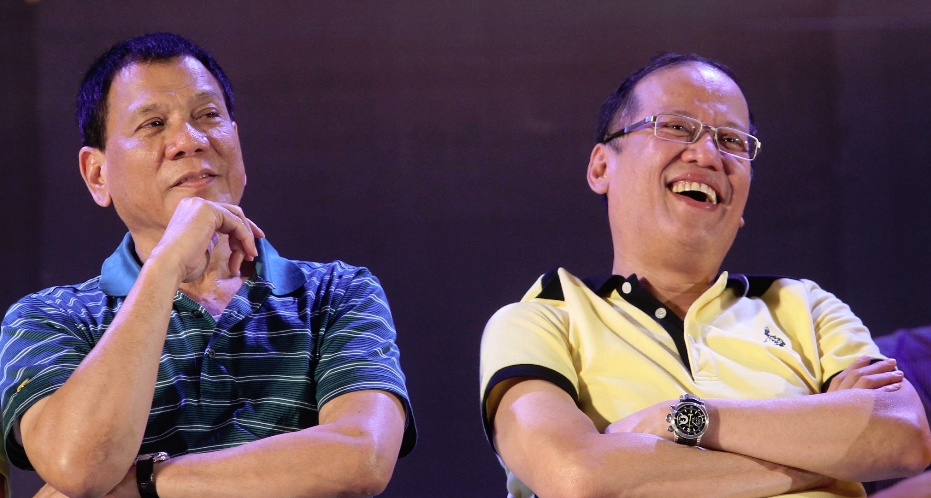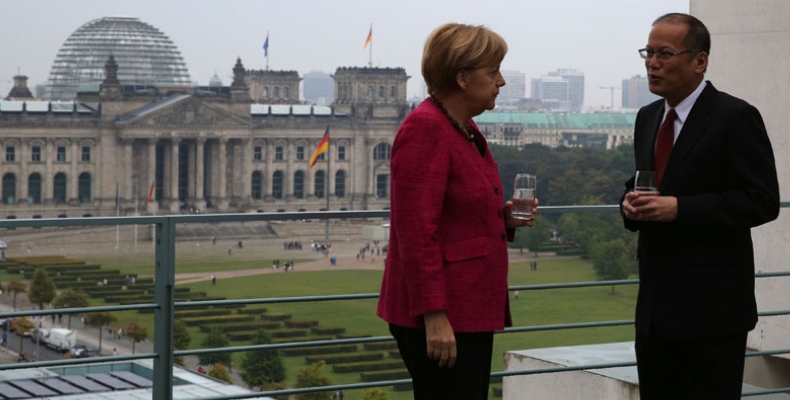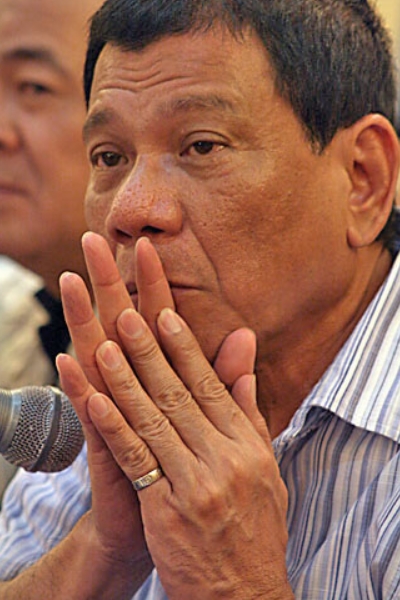Driving commercial and political engagement between Asia, the Middle East and Europe
Driving commercial and political engagement between Asia, the Middle East and Europe
Driving commercial and political engagement between Asia, the Middle East and Europe

Benigno Aquino III has made sure the Philippines is no longer the ‘sick man of Southeast Asia.’ Will the country be able to sustain its positive momentum after the 2016 elections? This will mostly depend on the ability of Rodrigo Duterte, Aquino’s successor, to transform himself from someone capable of managing a city into someone capable of managing a country. He will have a steep learning curve.
The election
The 2016 presidential election in the Philippines resulted in a landslide victory for Rodrigo Duterte, the first Mindanaoan ever to hold the position of President. Duterte, who turned 71 in March, is a newcomer to national politics, but has extensive experience in local government, having served as mayor of Davao, a city of 1.6 million, almost without interruption since 1988. Duterte is most well-known, and almost revered by some, for his strict law-and-order policies that resulted in a sharp decrease in Davao’s crime rate. However, critics that include the international NGO Human Rights Watch allege that Duterte accepted extralegal means to achieve this result, most notably the condoning of private ‘death squads’ engaged in the killing of suspected criminals.
Duterte entered the presidential race at the eleventh hour and almost immediately began to gain ground on his opponents. The election campaign initially saw former Interior Secretary Manuel Roxas, incumbent Vice President Jejomar Binay, and Senators Grace Poe and Miriam Defensor – Santiago pitted against each other and was characterised by a number of unpredictable developments. These included a legal challenge seeking Poe’s disqualification as a candidate on the basis of her citizenship; corruption allegations haunting Binay from his former role as Makati mayor; and questions concerning the true state of Defensor-Santiago’s health.
Duterte added his own share of controversies with his radical proposals to tackle the Philippines’ nationwide crime epidemic, which reminded many of martial law under Marcos; his unclear foreign policy positions, which alternated between deterring and forging closer ties with China; and his insensitive remarks about the rape of an Australian missionary that caused public embarrassment for the Australian and U.S. envoys to the Philippines. Duterte’s incendiary language polarised voters, evidenced by intense discussion on social media platforms.
His victory can be interpreted as the result of several factors, including what many have referred to as the disenchantment of large factions of society with the ruling political class. In a country said to be controlled by political dynasties and associated corporate interests, Duterte, as a relative outsider, most sharply contrasted with Roxas, the heir of a prominent family who appeared to be far removed from the realities of the average Filipinos’ lives.
In contrast to his next closest campaign rival, neophyte Senator Poe, Duterte was also able to point to his considerable experience in local government, where he has been credited with not only bringing about a sea-change in public security, but also for creating a business-friendly environment through the cutting of red tape.
Duterte’s voting base appears to have been the sizable emerging middle class, including the large number of Overseas Filipino Workers (OFWs) and those employed in the business process outsourcing (BPO) sector, who continued to struggle despite the country’s record economic advancements over the last six years.
As the campaign progressed, Duterte garnered the support of the upper middle class, whose concerns included the Philippines’ perennial infrastructure problems, lacking public security, and persistent official corruption. Duterte was seen as being able to address these issues decisively, evidenced by his receiving approximately a third of all votes cast, according to preliminary figures.
Aquino’s legacy
The strong voter preference for Duterte appeared counterintuitive to foreign observers, especially in the context of the largely positive investment climate that had been created by the incumbent administration. President Aquino has been credited with reversing the Philippines’ image as the ‘sick man of Asia,’ evidenced by strong foreign direct investment (FDI) inflows and bolstered credit rating figures.
Aquino’s overall legacy could be said to be mixed, with strong marks for economic management and foreign policy, and less success in anti-corruption and internal security.
Notable developments on the economic front included Aquino’s revival of the public private partnership (PPP) program, under which 12 contracts have been awarded so far, many as joint ventures between Filipino and foreign companies.
While the execution of the programme was not free from criticism and the number of awarded contracts is behind expectations, the program is largely perceived as fair and transparent, marking a positive milestone for the Philippines internationally.
The passing of legislation such as the Competition Act and the Cabotage Act, as well as the elimination of restrictions on foreign ownership in banking under Aquino, were seen as further signals to foreign investors that the country was serious about reform, and can be expected to stimulate further FDI into the Philippines in the future.
Aquino, whose election campaign and presidency ran on an anti-corruption platform, set a strong anti-corruption tone from the top. Since 2012, former President Arroyo has been facing corruption charges, and in 2015, Aquino also publicly severed ties with his vice president and former ally, Binay, over allegations of corruption during Binay’s tenure as mayor of Makati. But whilst these initiatives resulted in increased confidence from foreign investors, Aquino was unable to reverse endemic corruption in government. An example of the challenges faced in reforming the bureaucracy was Aquino’s inability to reform the Bureau of Customs. The resignation of his reform-minded appointee to the agency in April 2015 gives an indication of the difficulties in overcoming internal resistance to change at government agencies.
Neither was Aquino successful in resolving the country’s various internal security challenges. Several armed insurgent groups still operate in rural areas, including the Maoist New People’s Army (NPA), the secessionist Moro Islamic Liberation Front (MILF), and the Islamist splinter group Abu Sayyaf.
The fight against MILF, which has cost the lives of thousands of civilians, received a public setback after the failed raid in 2015 which resulted in the death of 44 police special forces. Following this, a proposal that would have created a new autonomous region in Southern Mindanao, one of the conditions for lasting peace with MILF, was suspended.

Outgoing Philippine President Benigno Aquino III is pictured meeting Germany’s Chancellor Angela Merkel in September 2014. Image credit: Wikimedia Commons
Aquino has received high marks for his foreign policy, which was mainly driven by the territorial disputes in the South China/West Philippine Sea, where the Philippines is contesting territory claimed by China, Vietnam, Malaysia, and Brunei. China’s increasing assertiveness has led the Philippines to deepen its defence ties with the United States and Japan. Concurrently, the Philippines has been seeking a legal resolution to the dispute and has submitted a case to the Permanent Court of Arbitration at the International Court of Justice in The Hague. It has been moderately successful in convincing other countries to consider a similar approach, thus decreasing the risk of international conflict.
What can be expected from a Duterte Presidency?
Judging by Duterte’s campaign promises and track record in Davao, his clear priority as President will be public security. In replication to his approach taken in Davao, this could be expected to, at least in the short term, include measures such as increased police funding, restrictions on the sale of liquor, and a curfew for minors. In the medium term, measures such as the establishment of a national crime-stopper hotline, installation of CCTV in parts of Manila, and reinstatement of capital punishment are likely.
In order to implement his campaign promise to tackle crime within six months, Duterte will have to employ aggressive tactics, including potentially the militarization of the police, a surge in raids on organised crime targets, and an escalation in the domestic war on drugs.
In the long term, a major risk that can be seen in Duterte’s public security strategy is his past endorsement of vigilante groups engaging in extrajudicial killings of suspects. Duterte’s campaign statement, in reference to his record as mayor of Davao, that the number of criminals killed under his presidency would rise to more than 100,000, and that he would significantly reduce crime in the Philippines within six months or resign, reminded many of the strongman tactics of former President Marcos who ruled the country under martial law from 1972 to 1981. If tolerated, or aided by parts of the police, this may ultimately compromise rule of law. Because of his public image as a strongman, Duterte’s victory was not well-received by human rights advocates and victims of the Marcos regime.
The business community also reacted guardedly to Duterte as a presidential candidate, evidenced by the drop in the Philippines Stock Exchange index coinciding with his surge in ratings during the run-up to the election. In the run-up to the elections, several Filipino tycoons expressed a preference for Roxas and Poe, who were seen to provide the establishment’s natural continuity to Aquino’s platform of good governance, anti-corruption, and pro-business policies. Duterte was unclear on his economic plan for the country during the election campaign, though more details have emerged, with Duterte releasing an eight-point plan for the economy after his victory.
The plan indicates that Duterte will increase government spending to deliver on more equitable development and social justice. His plan includes a progressive tax model and reforming the revenue collection agencies, expanding the conditional cash transfer system introduced by the Arroyo administration, and pursuing an agricultural development strategy. He has also promised to continue current macroeconomic policies, expanding the PPP program to address the country’s infrastructure needs, and further lifting foreign ownership restrictions through changes to the Constitution. He has previously indicated that his preference in infrastructure development would be toward projects addressing the country’s strained transport system. These announcements were well-received domestically and internationally and provided some relief to concerns that Duterte would be a stumbling block in the country’s economic development.
Duterte, who describes himself as a leftist, will be in a unique position to advance peace agreements with the NPA and MILF. He has well-established ties with NPA leaders, with whom he negotiated a detente during his time in Davao. After his victory, he offered several cabinet positions to the National Democratic Front of the Philippines (NDFP), an organisation with links to the NPA. His preference for changing the Philippines from a unitary to a federalist system will likely chime with the leadership of the MILF, for whom greater autonomy for Muslims in Mindanao is a core aim. Plausibly, this might temper the worrying trend of radicalization that saw Abu Sayyaf splinter groups pledging allegiance to the Islamic State in 2014.

Philippines president-elect Rodrigo R. Duterte in 2007 when he was Mayor of Davao City. Image copyright: Keith Kristoffer Bacongco
A weak spot in Duterte’s profile, however, was his vacillation when it came to foreign policy statements during the campaign. Duterte expressed support for engaging in bilateral talks with China over the territorial disputes and proposed the joint exploration of mineral resources in the South China Sea. This may undermine Aquino’s successful advances in seeking a multilateral solution to the dispute. Duterte also appears to hold a personal distaste for the United States, which he accused of interfering in the Philippines’ domestic peace process. Despite these concerns, it is likely that Duterte as a President will be much more conservative than as a candidate. Even if he rebalances in foreign policy, the country will by necessity remain under the American security umbrella while continuing to increase its own defence capabilities.
When taking office in July 2016, Duterte will have to start delivering on his ambitious promises. Although given a strong mandate, he is bound to face obstacles implementing his plans, especially with regard to his proposed Charter Change. It is still unclear whether he will be able to transform himself from someone capable of managing a city into someone capable of managing a country, but his recent policy announcements indicate that he is in the process of adjustment.
Michael Blomenhofer is a Senior Associate in Kroll’s Investigations and Disputes practice and is based in Singapore. Michael assists clients with a range of investigative services and has been involved in pre-investment due diligence, competitive intelligence, political risk and dispute advisory projects across Southeast Asia.
Prior to joining Kroll, he worked with a Singaporean think tank where he conducted research on regional infrastructure and transport connectivity, among other topics.
For more information about Kroll click here.
To contact Michael Blomenhofer email mblomenhorfer@kroll.com.
For Asia 2025, an Asia House publication launched on March 8, the Chairman and Chief Executive Officer of Ayala Corporation Jaime Augusto Zóbel de Ayala plh contributed his thoughts on the challenges and opportunities for urban development in the Philippines. Read the piece here.
